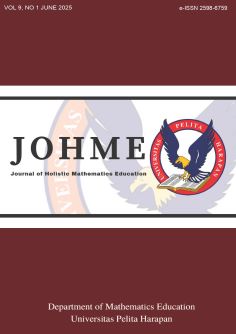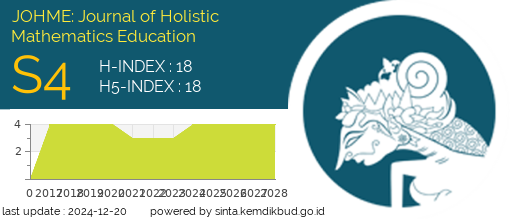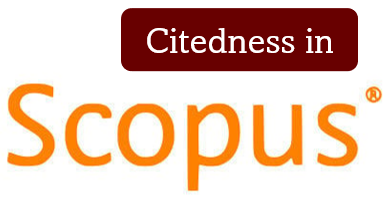BIBLIOMETRIC ANALYSIS OF MATHEMATICS EDUCATION APPLICATIONS INDEXED IN SCOPUS USING R STUDIO
DOI:
https://doi.org/10.19166/johme.v9i1.9761Keywords:
Bibliometric Analysis, Mathematics Education, Application Education, Scopus IndexedAbstract
This study aims to analyze the development of publications related to the creation of educational applications for mathematics teachers using R Studio. The method employed in this study is bibliometric analysis combined with a literature review of articles indexed in Scopus. Publication data were collected through Scopus.com to obtain articles from journals indexed by Scopus. A total of 2,389 relevant articles from 2018 to 2023 on mathematics education applications were analyzed. The findings indicate that research on the development of educational applications for mathematics teachers has been conducted and is growing. The number of related studies increased steadily from 2018 to 2022 but declined in 2023. The significant rise in publications up to 2022 reflects a strong interest in educational technology for mathematics, while the decline in 2023 presents new opportunities for research in emerging innovations such as artificial intelligence and adaptive learning. These findings may serve as a reference for application developers and educators in designing more effective mathematics learning tools and in encouraging the integration of technology into the curriculum. Further exploration is needed regarding the effectiveness of cutting-edge technologybased applications, disparities in access, and teacher training to ensure inclusive and sustainable implementation.
BAHASA INDONESIA ABSTRACT: Penelitian ini bertujuan untuk menganalisis perkembangan publikasi terkait pengembangan aplikasi pendidikan bagi guru matematika menggunakan R Studio. Metode yang digunakan dalam penelitian ini adalah analisis bibliometrik dan tinjauan pustaka dari artikel Indeks Scopus. Data publikasi dikumpulkan menggunakan Scopus.com untuk mendapatkan data artikel dalam jurnal yang terindeks oleh Scopus. Data diperoleh dari sebanyak 2389 artikel yang relevan dari tahun 2018 hingga 2023 untuk aplikasi pendidikan matematika. Hasil penelitian menunjukkan bahwa telah dilakukan penelitian terkait pengembangan aplikasi pendidikan bagi guru matematika. Pengembangan penelitian telah meningkat dari tahun 2018 hingga 2022 dan menurun pada tahun 2023. Peningkatan signifikan publikasi hingga 2022 mengindikasikan minat yang tinggi terhadap teknologi pendidikan matematika, sementara penurunan pada 2023 membuka peluang penelitian baru terkait inovasi terkini seperti AI dan pembelajaran adaptif. Temuan ini dapat menjadi acuan bagi pengembang aplikasi dan pendidik dalam merancang alat pembelajaran matematika yang lebih efektif serta mendorong integrasi teknologi dalam kurikulum. Perlunya eksplorasi lebih mendalam mengenai efektivitas aplikasi berbasis teknologi mutakhir, kesenjangan akses, dan pelatihan guru untuk memastikan penerapan yang inklusif dan berkelanjutan.
References
Aaidati, I. F., & Qohar, A. (2023). Development of arcs algebraic interactive learning media on the topic of algebraic forms. AIP Conference Proceedings, 2614(1), 1-10. https://doi.org/10.1063/5.0125870
Bhat, W. A., Khan, N. L., Manzoor, A., Dada, Z. A., & Qureshi, R. A. (2023). How to conduct bibliometric analysis using r-studio: A practical guide. European Economic Letters, 13(3), 681–700. https://doi.org/10.52783/eel.v13i3.350
Busro, B., Mailana, A., & Sarifudin, A. (2021). Pendidikan Islam dalam publikasi internasional: Analisis bibliometrik pada database scopus. Edukasi Islami: Jurnal Pendidikan Islam, 10(1), 413–426. Retrieved from http://jurnal.staialhidayahbogor.ac.id/index.php/ei/article/view/1591/800
Chen, T. Y., Wei, H. W., Cheng, Y. C., Leu, J. S., Shih, W. K., & Hsu, N. I. (2015). Integrating an e-book software with vector graphic technology on cloud platform. Procedia: Social and Behavioral Sciences, 176, 1012–1019. https://doi.org/10.1016/j.sbspro.2015.01.572
Defi, S. L., & Qohar, A. (2022). Development of learning media based on geogebra software on the topic of trigonometric ratios. AIP Conference Proceedings, 2479(1), 1-10. https://doi.org/10.1063/5.0099631
Donthu, N., Kumar, S., Mukherjee, D., Pandey, N., & Lim, W. M. (2021). How to conduct a bibliometric analysis: An overview and guidelines. Journal of Business Research, 133, 285–296. https://doi.org/10.1016/j.jbusres.2021.04.070
Durnali, M., Orakci, Ş., & Khalili, T. (2023). Fostering creative thinking skills to burst the effect of emotional intelligence on entrepreneurial skills. Thinking Skills and Creativity, 47, 1-10. https://doi.org/10.1016/j.tsc.2022.101200
Ellegaard, O., & Wallin, J. A. (2015). The bibliometric analysis of scholarly production: How great is the impact? Scientometrics, 105(3), 1809–1831. https://doi.org/10.1007/s11192-015-1645-z
Erviansyah, P., Windasari, I. P., & Kridalukmana, R. (2022). Perancangan e-commerce berbasis android dengan menggunakan metode pembayaran blockchain designing e-commerce based on android using blockchain payment method. Jurnal Teknik Komputer, 1(3), 101–111. https://doi.org/10.14710/jtk.v1i3.36844
Fahmi, A. I. K., & Qohar, A. (2023). Development of android-based m-learning applications on the topic of similarity. AIP Conference Proceedings, 2569(1), 1-10. https://doi.org/10.1063/5.0112230
Famhas, R. H., & Qohar, A. (2023). Android based travel game media development on the topic of two-variables linear equation. AIP Conference Proceedings, 2491(1), 1-10. https://doi.org/10.1063/5.0105212
Farida, N. (2020). Analisis bibliometrik berdasarkan pendekatan co-word: Kecenderungan penelitian bidang kearsipan pada Jurnal Khazanah dan Journal of Archive and Record tahun 2016–2019. Khazanah: Jurnal Pengembangan Kearsipan, 13(2), 91-109. https://doi.org/10.22146/khazanah.55690
Haley, J. E., & Miller, J. L. (2019). Is scopus polluting its own database by indexing junk articles? A case study of five journals. MPRA: Munich Personal RePEc Archive, 1-7. Retrieved from https://mpra.ub.uni-muenchen.de/91662/1/MPRA_paper_91662.pdf
Harisman, Y., Dwina, F., Nasution, M. L., Amiruddin, M. H., & Syaputra, H. (2023). The development of proton-electron math e-comic to improve special needs students’ mathematical concepts understanding. Infinity Journal, 12(2), 359–376. https://doi.org/10.22460/infinity.v12i2.p359-376
Heydari, M., Mehraeen, E., Javaherikiyan, E., Mehrabi, N., Langarizadeh, M., Aghamohammadi, V., Moghaddam, H. R., & Nasiri, K. (2023). Design, development and evaluation of a mobile-based self-care application for patients with COVID-19 not requiring hospitalization: A study of Northwest of Iran. BMC Medical Informatics and Decision Making, 23(1), 1–9. https://doi.org/10.1186/s12911-023-02381-3
Hung, C. T., Wu, S. E., Chen, Y. H., Soong, C. Y., Chiang, C., & Wang, W. (2024). The evaluation of synchronous and asynchronous online learning: Student experience, learning outcomes, and cognitive load. BMC Medical Education, 24(1), 1–8. https://doi.org/10.1186/s12909-024-05311-7
Indrayati. (2016). On transforming monotonous classes: Implementing problem based learning conjoined with cooperative learning in college. International Journal of Management and Administrative Sciences (IJMAS), 3(9), 48–56. Retrieved from https://www.researchgate.net/journal/Journal-of-Educational-Change-1573-1812
Kemp, S. (2023). Digital 2023: Indonesia. Retrieved from https://datareportal.com/reports/digital-2023-indonesia
Kholid, M. N., Hendriyanto, A., Sahara, S., Muhaimin, L. H., Juandi, D., Sujadi, I., Kuncoro, K. S., & Adnan, M. (2023). A systematic literature review of technological, pedagogical and content knowledge (TPACK) in mathematics education: Future challenges for educational practice and research. Cogent Education, 10(2). https://doi.org/10.1080/2331186X.2023.2269047
Kadirhanogullari, M. K., & Kose, E. O. (2023). Bibliometric analysis: Technology studies in science education. International Journal of Technology in Education and Science, 7(2), 167–191. https://doi.org/10.46328/ijtes.469
Kristianti, N., Purnawati, N., & Suyoto. (2018). Virtual education with puzzle games for early childhood: A study of Indonesia. International Journal of Engineering Pedagogy, 8(2), 14–22. https://doi.org/10.3991/ijep.v8i2.7943
Kusumah, Y. S., Dahlan, J. A., Juandi, D., & Arifin, S. (2023). The trends of studies in technology-assisted inquiry-based learning: The perspective of bibliometric analysis. Journal of Engineering Science and Technology, 18, 69–80. Retrieved from https://www.researchgate.net/profile/Samsul-Arifin-2/publication/368365958_The_Trends_of_Studies_in_Technology-assisted_Inquiry-based_Learning_The_Perspective_of_Bibliometric_Analysis/links/63e992ebe2e1515b6b91100c/The-Trends-of-Studies-in-Technology-assisted-Inquiry-based-Learning-The-Perspective-of-Bibliometric-Analysis.pdf
Mahyudi, R., & Qohar, A. (2022). Developing android games-based mathematics instructional media on the topic of one variable linear equation. AIP Conference Proceedings, 2468(1), 1-10. https://doi.org/10.1063/5.0102552
Marlina, Rahim, A., Ria, R. R. P., & Hadi, H. S. (2023). Technological pedagogical content knowledge in chemistry education: A review and bibliometric analysis using vosviewer and rstudio applications. Moroccan Journal of Chemistry, 11(3), 742–755. Retrieved from https://revues.imist.ma/index.php/morjchem/article/view/39572/21217
Matcharashvili, T., Tsveraidze, Z., Sborshchikovi, A., & Matcharashvili, T. (2014). The importance of bibliometric indicators for the analysis of research performance in Georgia. Trames: Journal of the Humanities and Social Sciences, 18(4), 345–356. https://doi.org/10.3176/tr.2014.4.03
Nikmah, S. M., & Qohar, A. (2023). Development of geogebra-assisted mathematics learning media based on guided discovery on triangle topic. AIP Conference Proceedings, 2540(1), 11-20. https://doi.org/10.1063/5.0105865
Nurwita, F., Kusumah, Y. S., & Juandi, D. (2023). Developing learning media based on android application for improving math problem solving skill of junior high school students on Pythagorean theorem. AIP Conference Proceedings, 2734(1), 11-20. https://doi.org/10.1063/5.0163595
Pranckutė, R. (2021). Web of science (WoS) and Scopus: The titans of bibliographic information in today’s academic world. Publications, 9(1), 1-59. https://doi.org/10.3390/publications9010012
Prasetyo, R. D., & Qohar, A. (2023). Development of android based learning media on the topic of one-variable linear equation. AIP Conference Proceedings, 2491(1), 11-20. https://doi.org/10.1063/5.0105218
Purnawati, L., & Qohar, A. (2022). Development of partasi learning media on the topic of rotation in geometry transformation. AIP Conference Proceedings, 2566(1), 17-30. https://doi.org/10.1063/5.0116385
Putra, L. S. A., Wigyarinto, F. T. P., Tjahjamoorniarsih, N., Kusumawardhani, E., Gunawan, V. A., Saragih, A. S., & Suryani, L. (2024). Application-based learning: Design, development, and implementation of a case study. Journal of Theoretical and Applied Information Technology, 102(5), 2084–2098. Retrieved from https://www.jatit.org/volumes/Vol102No5/31Vol102No5.pdf
Rachmawati, A. D., Juandi, D., & Darhim, D. (2023). Application of came to improve mathematical thinking ability and learning motivation: A systematic literature review. Journal of Engineering Science and Technology, 18(4), 56–64. Retrieved from https://jestec.taylors.edu.my/Special%20Issue%20ISCoE%202022_3/ISCoE%203_07.pdf
Ramadhanti, F. T., & Juandi, D. (2022). Problem-based learning assisted by geogebra and cabri 3D for understanding of geometrical concepts: A systematic review and meta-analysis. AIP Conference Proceedings, 2468(1), 20-30. https://doi.org/10.1063/5.0102475
Romanow, D., Cline, M. K., & Napier, N. P. (2024). A response to covid: From traditional to remote learning using a flipped classroom pedagogy and its impact on BI skills attainment. Journal of Information Systems Education, 35(1), 99–111. https://doi.org/10.62273/NOBF5942
Safarini, D., & Juandi, D. (2023). Students’ cognitive developments in learning basic differentiation rules using the desmos classroom based on the three worlds of mathematics. Proceedings of the Asian Technology Conference in Mathematics, 307–321. Retrieved from https://www.researchgate.net/publication/379574218_Students'_Cognitive_Developments_in_Learning_Basic_Differentiation_Rules_Using_the_Desmos_Classroom_Based_on_the_Three_Worlds_of_Mathematics
Safarini, D., Darhim, & Juandi, D. (2023). Students’ proceptual thinking outcomes in learning differentiability using desmos classroom activities based on the three worlds of mathematics framework. Mathematics Teaching-Research Journal, 15(3), 136–160. Retrieved from https://files.eric.ed.gov/fulltext/EJ1408235.pdf
Samura, A. O., Juandi, D., Said, A. M., & Tamur, M. (2023). Application of open-ended learning towards mathematics creative thinking ability of junior high school students. AIP Conference Proceedings, 2734(1), 20-30. https://doi.org/10.1063/5.0155361
Sari, M. R., & Qohar, A. (2023). Development of mathematics learning media based on articulate storyline 3 on cube materials. AIP Conference Proceedings, 2614(1), 1-10. https://doi.org/10.1063/5.0125871
Seino, T., & Foster, C. (2021). Analysis of the final comments provided by a knowledgeable other in lesson study. Journal of Mathematics Teacher Education, 24(5), 507–528. https://doi.org/10.1007/s10857-020-09468-y
Setiawan, R. P., Nasution, A. H., Hanafia, A., Arta, Y., Ramadhan, R. A., & Kadir, E. A. (2022). Interactive English teaching and learning based on mobile application. Proceedings of the International Conference on Electrical Engineering and Informatics, 2022, 181–185. https://doi.org/10.1109/IConEEI55709.2022.9972321
Soler, R. R., Toril, J. U., & Valenciano, J. P. (2020). Worldwide trends in the scientific production on rural depopulation, a bibliometric analysis using bibliometrix r-tool. Land Use Policy, 97, 1-10. https://doi.org/10.1016/j.landusepol.2020.104787
Suartama, I. K., Simamora, A. H., Susiani, K., Suranata, K., Yunus, M., & Tisna, G. D. (2023). Designing gamification for case and project-based online learning: A study in higher education. Journal of Education and E-Learning Research, 10(2), 86–98. https://doi.org/10.20448/jeelr.v10i2.4432
Tjahjamoorniarsih, N., Putra, L. S. A., Kusumawardhani, E., Pramadita, S., & Gunawan, V. A. (2023). An android e-learning application to support academic learning: Design, development, and implementation of a case study. International Journal of Electrical and Electronic Engineering and Telecommunications, 12(5), 363–372. https://doi.org/10.18178/ijeetc.12.5.363-372
Tupan, T. (2023). Analisis bibliometrik penelitian literasi informasi bidang ilmu sosial periode 2018-2022. Al-Kuttab: Jurnal Kajian Perpustakaan, Informasi dan Kearsipan, 5(1), 11–20. https://doi.org/10.24952/ktb.v5i1.7361
Downloads
Published
How to Cite
Issue
Section
License
Copyright (c) 2025 Tanti Listiani, M.Pd., Saragih Melda

This work is licensed under a Creative Commons Attribution-ShareAlike 4.0 International License.
Authors who publish with this journal agree to the following terms:
1) Authors retain copyright and grant the journal right of first publication with the work simultaneously licensed under a Creative Commons Attribution License (CC-BY-SA 4.0) that allows others to share the work with an acknowledgement of the work's authorship and initial publication in this journal.
2) Authors are able to enter into separate, additional contractual arrangements for the non-exclusive distribution of the journal's published version of the work (e.g., post it to an institutional repository or publish it in a book), with an acknowledgement of its initial publication in this journal.
3) Authors are permitted and encouraged to post their work online (e.g., in institutional repositories or on their website). The final published PDF should be used and bibliographic details that credit the publication in this journal should be included.”










